May 21, 2025 | 03:09 GMT +7
May 21, 2025 | 03:09 GMT +7
Hotline: 0913.378.918
May 21, 2025 | 03:09 GMT +7
Hotline: 0913.378.918
We visited the rice fields in Hop Thanh village, Quy Mong commune, Tran Yen district (Yen Bai province) in the last days of autumn. At this time, most rice fields in all localities in Tran Yen district have been harvested. Yet in the fields of Hop Thanh village, dozens of hectares of black sticky rice of the local people are just in the green and red stage, and it will take about half a month for people to start harvesting.
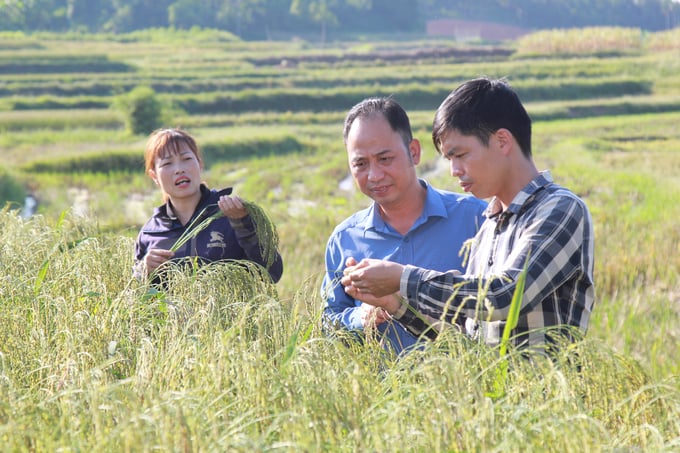
The area of specialty black sticky rice is increasingly expanding in Quy Mong commune, Tran Yen district. Photo: Thanh Tien.
Mr. Phung Tien Hien - the Vice Chairman of the commune, is also belong to the Muong ethnic group, he was born and raised in Hop Thanh village. As he walked, Mr. Hien talked about his people's sticky rice variety with a proud voice: "Since I was born, I have seen people in the village cultivating this rice variety. People sow it themselves, plant it, and passed it down to their future generations."
Every morning, when you wake up and walk along the rice fields, you can feel the pleasant fragrance. Especially at the time of flowering, drying or when the rice is ripe, the fragrance emitted is even more fragrant. Black sticky rice is often used in important occasions of villages and communes such as festivals, full moon days, especially Lunar New Year. Black sticky rice is both a food and a cultural feature of the Muong people.
We visited the rice fields of Mr. Dinh Cong Tuyen's family in Hop Thanh village. This year's crop, Mr. Tuyen's family planted nearly 5 acres of black sticky rice. Up to this point, the rice field is in the solid, red-tail stage, and will be harvested in about 10 days. According to Mr. Tuyen, this year's rice harvest is good, with an estimated yield of 1.5 quintals/acre. The yield of black sticky rice is not as high as hybrid rice varieties, the growing time is long but the price is 3 times higher (from VND 30,000/kg or more).
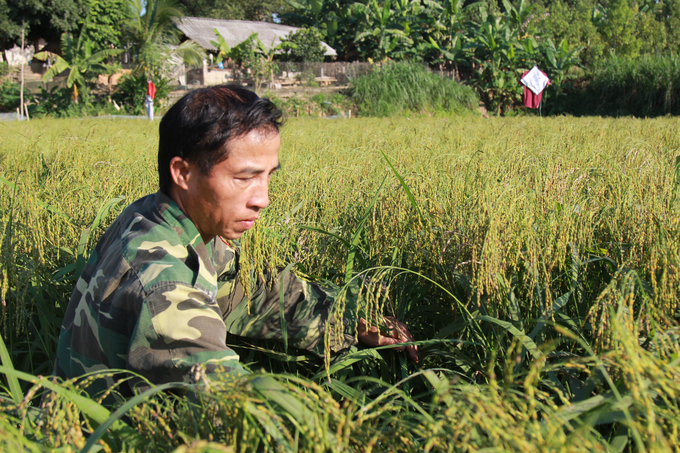
The native black sticky rice of the Muong people has a growing period of 5 months, so it is often harvested nearly 1 month later than other rice varieties. Photo: Thanh Tien.
"I don't know when the black sticky rice variety first appeared. A few decades ago, I saw the elders in the village cultivating this rice variety to make Chung cake every Tet holiday. In the village, each household only cultivates a few meters to a few acres to make food for daily life. After the harvest, people choose big rice flowers with small, firm grains and bring them back to dry and clean them to make seeds for the next crop. Just like that, it is passed down and preserved for many generations in this land," Mr. Tuyen said.
The special thing about the black sticky rice variety of the Muong people in this land is that it cannot be planted during the winter season because of the cold weather. The rice plants turn green well but do not bloom or flower. Since ancient times, the elders have tried sowing in the dream season but they did not get a harvest, so later on no one planted in this crop anymore. The summer crop is the only crop of the year when people cultivate black sticky rice, usually planted in May and harvested in September and October of the lunar calendar.
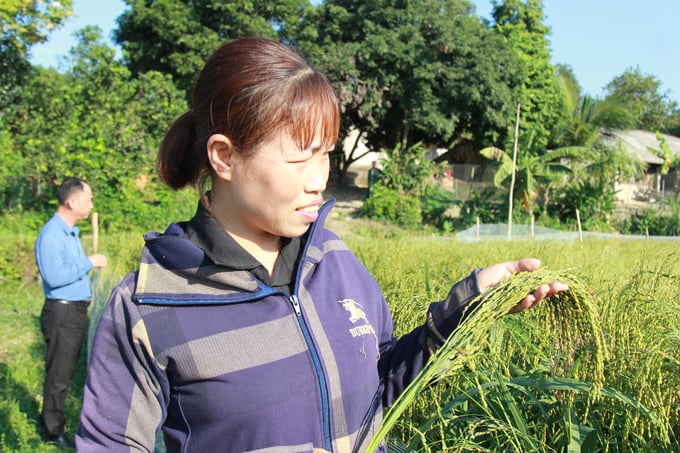
Black sticky rice varieties can only be produced during the growing season (from May to October). Photo: Thanh Tien.
According to the experience of the Muong people here, when the trees sprout buds and the bamboo trees in the forest bear fruit, they begin sowing seedlings and preparing the land for sowing. Today, based on the calendar, planting will be completed before Doan Ngo Festival (5/5 lunar calendar). The rice plants grow for 5 months before being harvested, with a yield of 1.2 - 1.5 quintals/acre. After the harvest, people in the village choose the most beautiful and fragrant batches of rice to cook sticky rice and offer it to the village communal house during the new rice celebration.
Ms. Dinh Thi Thanh - the Head of Hop Thanh village said: Previously, each household only planted a few small meters to get the rice to wrap Chung cake during the Lunar New Year, but now, the area for cultivating black sticky rice in the village is increasingly extending. The whole village now has nearly 20 hectares, cultivated into a concentrated area, creating commodity products that bring income to the people.
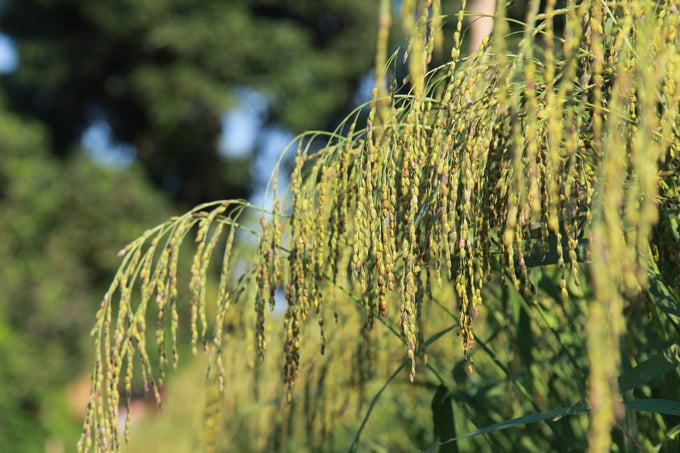
The yield of this specialty rice variety ranges from 1.2 to 1.5 quintals/acre. Photo: Thanh Tien.
Currently, in Quy Mong commune, Quy Mong specialty black sticky rice cooperative has been established. The members of the cooperative are households cultivating black sticky rice. Cooperatives are a bridge to support households in seeds and production techniques with the goal of promoting the transformation of plant variety structure to improve productivity, quality, production efficiency, and gradually changing the methods, from small-scale farming to concentrated goods, purchasing and consuming products. In the immediate future, post-harvest rice products are supplied mainly locally and in neighboring communes.
Mr. Phung Tien Hien - the Vice Chairman of the Commune People's Committee added: The black sticky rice variety of the Muong ethnic group is a pure rice variety with characteristics of tall plants, even ears, and a high percentage of firm grains. The quality of rice is sticky and fragrant for a long time, so it is favored by many consumers. From black sticky rice, sticky rice wine, cakes can be processed... The consumption market is increasingly expanding, especially many traders place orders before farmers harvest, and even come to purchase. Fresh rice right in the field with prices from VND 30,000/kg or more. The income value is 2-3 times higher than other rice varieties.
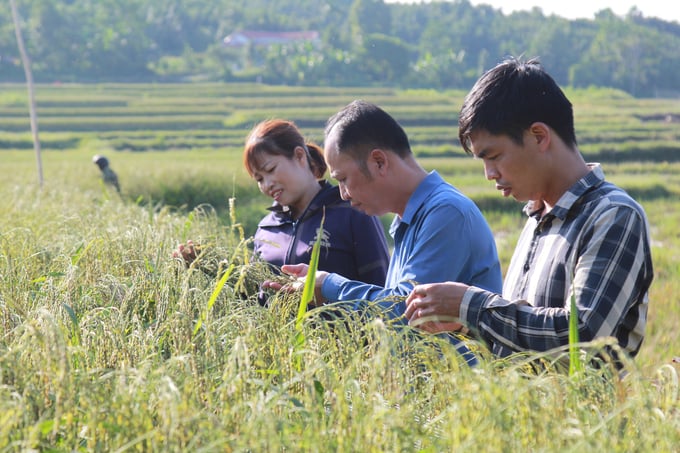
Quy Mong commune has established a specialty black sticky rice cooperative, sticky rice products meet OCOP 3-star standards. Photo: Thanh Tien.
In October 2023, the black sticky rice product of Quy Mong commune was just recognized as an OCOP product of Yen Bai province. The commune government is completing procedures for registering trademarks and protective labels, developing packaging designs and private labels to build product brands and increase competitiveness in the market.
Currently, the commune government is coordinating with functional agencies to actively propagate and guide people to plant and care for rice in an organic and semi-organic direction, without using chemical pesticides or herbicides and instead use biological pesticides and weeding manually. From there, preserve and improve the unique quality of the product in terms of characteristic aroma, round rice grains, ivory white color and high nutritional content.
Besides, ensuring regulations on origin, quality criteria, food safety and hygiene, packaging, transportation and preservation of products. This is the important key to making black sticky rice products widely available in supermarkets and further, bigger markets.
Translated by Bao Ngoc

(VAN) Attempts to bring down the price of the Japanese staple have had little effect amid a cost-of-living crisis.

(VAN) Fourth most important food crop in peril as Latin America and Caribbean suffer from slow-onset climate disaster.

(VAN) Shifting market dynamics and the noise around new legislation has propelled Trouw Nutrition’s research around early life nutrition in poultry. Today, it continues to be a key area of research.

(VAN) India is concerned about its food security and the livelihoods of its farmers if more US food imports are allowed.

(VAN) FAO's Director-General emphasises the need to work together to transform agrifood systems.

(VAN) Europe is facing its worst outbreak of foot-and-mouth since the start of the century.

(VAN) The central authorities, in early April, released a 10-year plan for rural vitalization.